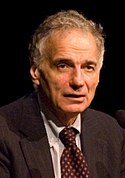
Ralph Nader is an American perennial presidential candidate, political activist, author, lecturer, and attorney noted for his involvement in consumer protection, environmentalism, and government reform causes. He became famous in the 1960s and 1970s for his book Unsafe at Any Speed, which criticized the automotive industry for its safety record and helped lead to the passage of the National Traffic and Motor Vehicle Safety Act in 1966.

The 2000 United States presidential election was the 54th quadrennial presidential election, held on Tuesday, November 7, 2000. Republican candidate George W. Bush, the incumbent governor of Texas and eldest son of the 41st president, George H. W. Bush, won the election, defeating incumbent Vice President Al Gore. It was the fourth of five American presidential elections, and the first since 1888, in which the winning candidate lost the popular vote, and is considered one of the closest U.S. presidential elections, with long-standing controversy about the result. Gore conceded the election on December 13.

The Peace and Freedom Party (PFP) is a left-wing political party with affiliates and former members in more than a dozen American states, including California, Colorado, Florida, Hawaii, Indiana and Utah, but none now have ballot status besides California. Its first candidates appeared on the 1966 New York ballot. The Peace and Freedom Party of California was organized in early 1967, gathering over 103,000 registrants which qualified its ballot status in January 1968 under the California Secretary of State Report of Registration.

The Reform Party of the United States of America (RPUSA), generally known as the Reform Party USA or the Reform Party, is a centrist political party in the United States, founded in 1995 by Ross Perot.

Peter Miguel Camejo Guanche was a Venezuelan American author, activist, politician and Sailing Olympian. In the 2004 United States presidential election, he was selected by independent candidate Ralph Nader as his vice-presidential running mate on a ticket which had the endorsement of the Reform Party.
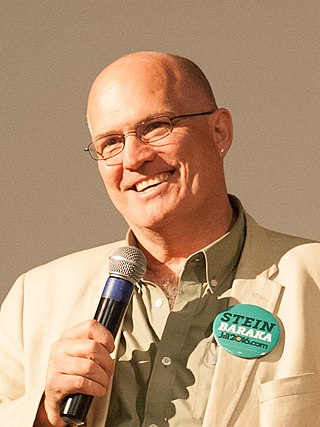
David Keith Cobb is an American political activist who was the Green Party presidential candidate for the 2004 election. Cobb later became the campaign manager for fellow Green Jill Stein for her presidential run in 2016.

Michael James Badnarik was an American software engineer, political figure, and radio talk show host. He was the Libertarian Party nominee for President of the United States in the 2004 elections, and placed fourth in the race, behind independent candidate Ralph Nader and the two major party candidates, George W. Bush and John Kerry. Two years later Badnarik ran as a Libertarian Party candidate in the 2006 congressional elections for Texas's 10th congressional district seat near Austin. In a three candidate field, Badnarik came in third, receiving 7,603 votes for 4.3% of the vote.
John Howard Buchanan is a freelance journalist, and was a fringe Republican candidate in the 2004 Presidential election. Buchanan was previously based in Florida and lives in rural Georgia.

The 2004 presidential campaign of Ralph Nader, political activist, author, lecturer and attorney began on February 23, 2004. This was Nader's third presidential campaign, having run in 1996 and 2000 campaign as the candidate for the Green Party; in 2004 he ran as an independent candidate. Nader won the 2002 endorsement of the Reform Party USA, and thus appeared on the ballot as the Reform Party candidate in several states. In some states, Nader was on the ballot as an independent candidate, while in other states, Nader was deemed not to have met the requirements for ballot access.

The Green Party of Oklahoma is a political party in the U.S. state of Oklahoma. It was formed in 2002 through a gradual coalition of various state green groups and received its accreditation from the Green Party of the United States (GPUS) in May 2005. Its stated aims are a commitment to environmentalism, non-violence, social justice, and grassroots democracy.
The Green National Convention is the presidential nominating convention of the Green Party of the United States (GPUS). Though the Green National Committee (GNC) meets annually in a "national meeting", the convention is convened by the GNC once every four years in order to nominate an official candidate in the upcoming U.S. presidential election, and to officially adopt the party platform and rules for the election cycle.
The Green Party of the United States originated in 1984 when 62 people from the U.S. gathered in St. Paul, Minnesota and founded the first national Green organization - the Committees of Correspondence. The Green Party of the U.S. has gone through several evolutions, from debating theory and praxis in the 1980s, to starting state parties in the 1990s, to the founding of a national political party in the 2000s.
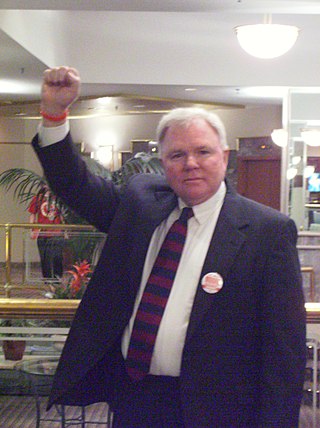
Brian Patrick Moore is an American politician and founder of antiwar organization Nature Coast Coalition for Peace & Justice. A perennial candidate, he was the presidential nominee of the Socialist Party USA for the 2008 United States presidential election; he waged several campaigns for mayor and city council in Washington, D.C., and twice ran for the United States House of Representatives from Florida's 5th congressional district, winning none; he ran for the Democratic Party nomination for Governor of Florida in 2010, but lost in the primary election.
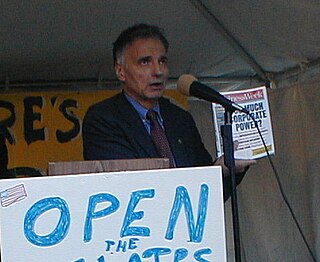
The 2000 presidential campaign of Ralph Nader, political activist, author, lecturer and attorney, began on February 21, 2000. He cited "a crisis of democracy" as motivation to run. He ran in the 2000 United States presidential election as the nominee of the Green Party. He was also nominated by the Vermont Progressive Party and the United Citizens Party of South Carolina. The campaign marked Nader's second presidential bid as the Green nominee, and his third overall, having run as a write-in campaign in 1992 and a passive campaign on the Green ballot line in 1996.

The 2004 Green National Convention was held at the Hyatt Regency and the Midwest Airlines Center in Milwaukee, Wisconsin on June 23–28, 2004 to nominate the Green Party's candidates for president and vice president.
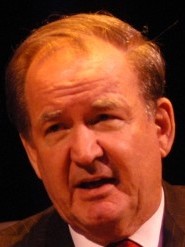
Following Ross Perot's impressive showing during the 1996 presidential election, the Reform Party of the United States of America became the country's largest third party. The party's 2000 presidential candidate would be entitled to $12.5 million in matching funds. Several high-profile candidates vied for the nomination, including Donald Trump, Pat Buchanan, and physicist John Hagelin. For a brief time, Congressman John B. Anderson and Congressman Ron Paul were considered potential candidates, but both ultimately declined to seek the nomination.

The Chuck Baldwin presidential campaign of 2008 began April 10, 2008 as pastor and radio host Chuck Baldwin of Florida announced his candidacy for the Constitution Party presidential nomination. He previously served as the party's vice-presidential nominee in 2004. Baldwin's main opposition for the nomination was former ambassador Alan Keyes, who had just left the Republican Party. After a campaign touting his stands on civil liberties, foreign affairs, and religion, Baldwin won the nomination at the April 26 Constitution Party National Convention. Attorney Darrell Castle was selected as his running mate.

The 2008 presidential campaign of Cynthia McKinney, member of the U.S. House of Representatives from Georgia's 11th district (1993–97) and 4th district, began on December 16, 2007, as a candidate for the Green Party presidential nomination via YouTube. She and her running mate Rosa Clemente accepted the Green Party's presidential nomination July 12, 2008 at the 2008 Green National Convention. Her campaign focused on issues such as racial profiling, September 11, 2001 attacks, and the Green Party's 10 key values. She also supported statehood for the District of Columbia, slavery reparations, electoral reforms including instant runoff voting, and calls for abolishing the death penalty and the War on Drugs.

Theodore C. Weill was an American politician who served as the presidential nominee of the Reform Party of the United States of America during the 2008 presidential election.
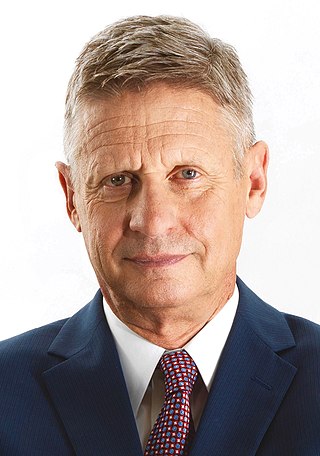
The 2016 Libertarian Party presidential primaries and caucuses allowed electors to indicate non-binding preferences for the Libertarian Party's presidential candidate. These differed from the Republican or Democratic presidential primaries and caucuses in that they did not appoint delegates to represent a candidate at the party's convention to select the party's nominee for the United States presidential election. The party's nominee for the 2016 presidential election was chosen directly by registered delegates at the 2016 Libertarian National Convention, which ran from May 26 to 30, 2016. The delegates nominated former New Mexico Governor Gary Johnson for President and former Massachusetts Governor Bill Weld for Vice President.
